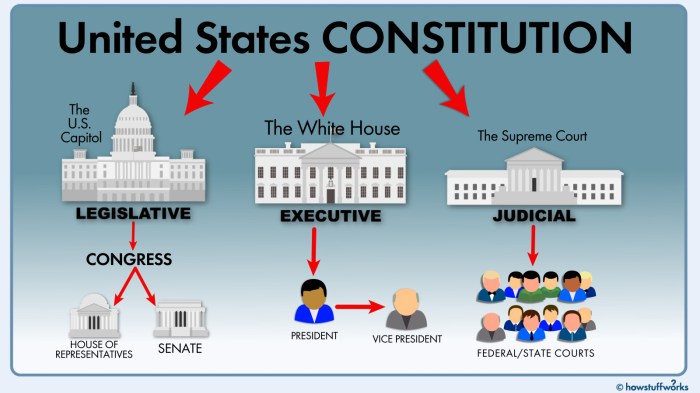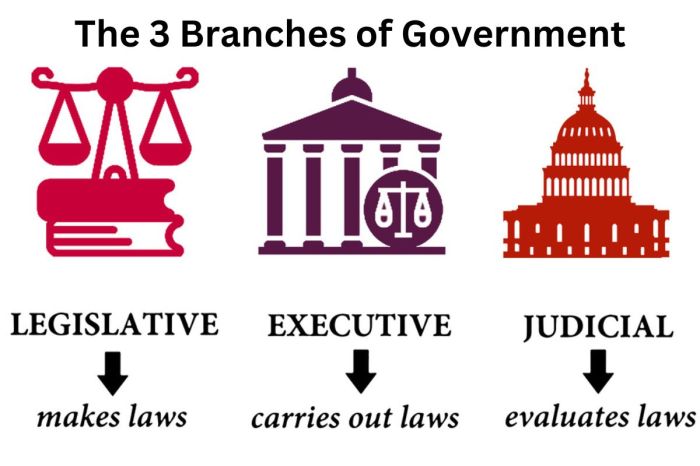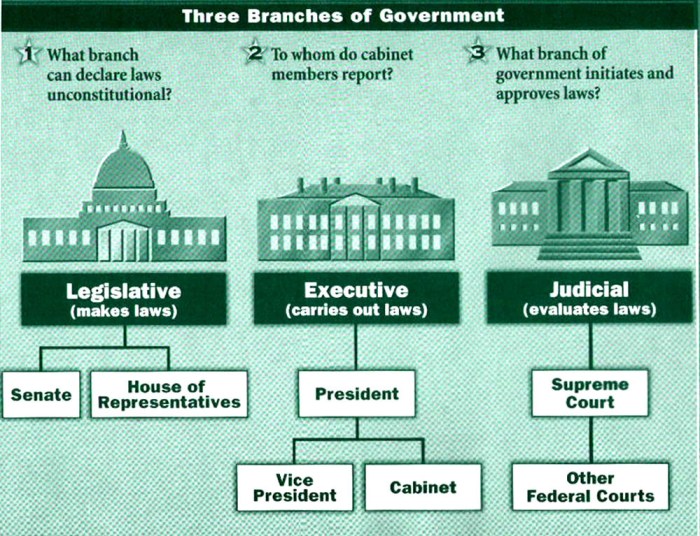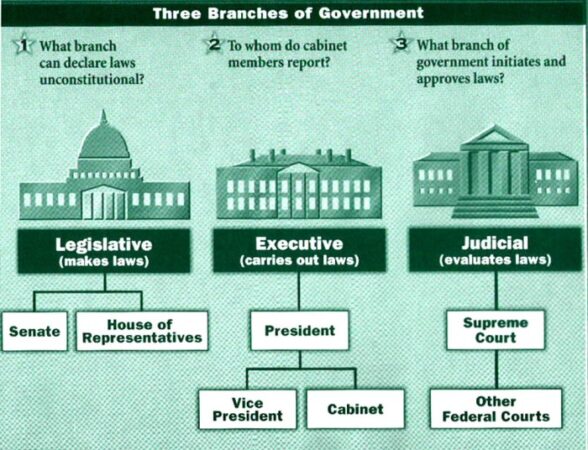
What is the rule of law in the constitution? This question lies at the heart of a democratic society, where everyone, from the highest official to the ordinary citizen, is bound by the same set of laws. It’s the bedrock upon which fairness, equality, and justice are built, ensuring that no one is above the law and everyone is treated equally under its provisions.
The rule of law is not just a legal concept; it’s a fundamental principle that underpins the very fabric of our society. It provides a framework for resolving disputes, protecting individual rights, and promoting a stable and prosperous environment. It ensures that the government operates within clear boundaries, preventing arbitrary power and upholding the principles of due process and equal protection under the law.
Introduction to the Rule of Law
The rule of law is a fundamental principle that ensures a society is governed by clear and consistent laws, applied equally to all individuals, and enforced fairly and transparently. It is not about the rule of any particular person or group, but rather the rule of law itself.
The rule of law is a cornerstone of a functioning democracy. It protects individual rights, promotes stability and predictability, and fosters trust in the legal system.
Examples of the Rule of Law in Society
The rule of law manifests itself in various aspects of everyday life:
- Traffic Laws: When we stop at a red light, we are adhering to a law that applies equally to everyone, regardless of their social status or wealth.
- Property Rights: The rule of law ensures that individuals can own property and that their ownership is protected. This creates a stable environment for investment and economic growth.
- Criminal Justice System: The rule of law guarantees fair trials, due process, and the presumption of innocence. This protects individuals from arbitrary arrests and ensures that justice is served impartially.
- Contract Enforcement: The rule of law ensures that contracts are upheld and that individuals can rely on their agreements with others. This promotes business confidence and economic activity.
Importance of the Rule of Law for a Functioning Democracy
The rule of law is essential for a functioning democracy because it:
- Protects Individual Rights: By establishing a framework of laws that apply equally to all, the rule of law safeguards individual freedoms and rights, preventing arbitrary government actions.
- Promotes Stability and Predictability: A society governed by the rule of law provides a stable and predictable environment for individuals and businesses. This encourages investment, economic growth, and social progress.
- Fosters Trust in the Legal System: When individuals believe that the laws are applied fairly and impartially, they are more likely to trust the legal system and cooperate with it. This is crucial for maintaining social order and resolving disputes peacefully.
- Limits the Power of the Government: The rule of law acts as a constraint on the power of the government, preventing it from acting arbitrarily or exceeding its authority. This safeguards individual liberty and ensures that the government is accountable to the people.
The Rule of Law in the Constitution

The Constitution of the United States is the supreme law of the land and serves as the foundation for the rule of law in the country. It establishes a framework for a government of limited powers, ensuring that all citizens are subject to the same laws and that no one is above the law. This principle is deeply ingrained in the Constitution’s text and is further strengthened by various provisions that explicitly guarantee fairness and equality before the law.
Key Provisions Establishing the Rule of Law
The Constitution lays out a clear framework for the rule of law through several key provisions. These provisions are essential in ensuring that the government operates within the bounds of the law and that individual rights are protected.
- Article I, Section 9: This section Artikels limitations on the powers of Congress, prohibiting the passage of ex post facto laws (laws that criminalize actions that were legal when they were committed) and bills of attainder (laws that declare a person guilty of a crime without a trial). These prohibitions are crucial for ensuring fairness and preventing arbitrary punishment.
- Article III, Section 2: This section establishes the jurisdiction of the federal courts, including the power to hear cases involving the Constitution, federal laws, and treaties. This provision ensures that the courts can review and interpret the law, ensuring its consistent application and upholding the rule of law.
- Article VI, Clause 2: This clause, known as the Supremacy Clause, establishes the Constitution as the supreme law of the land. It declares that federal laws and treaties are superior to state laws, ensuring a consistent application of the law throughout the nation.
- Fourteenth Amendment, Section 1: This amendment guarantees equal protection under the law to all citizens. It prohibits states from denying any person within their jurisdiction the equal protection of the laws. This provision ensures that all individuals are treated equally before the law, regardless of their race, religion, or other characteristics.
Guaranteeing Fairness and Equality
The provisions mentioned above are not merely abstract principles but have real-world implications in ensuring fairness and equality before the law. For instance, the prohibition on ex post facto laws prevents individuals from being punished for actions that were legal at the time they were committed. Similarly, the guarantee of equal protection under the law ensures that all citizens are treated equally by the government, regardless of their background or status.
Role of the Judiciary
The judiciary plays a critical role in upholding the rule of law. As the interpreter of the Constitution, the courts are tasked with ensuring that laws are consistent with the Constitution and that they are applied fairly and equally. This responsibility is crucial for maintaining the rule of law and ensuring that the government remains accountable to the Constitution. The judiciary has the power to strike down laws that violate the Constitution, as seen in landmark cases like Marbury v. Madison, which established the principle of judicial review.
Examples of the Rule of Law in Action

The rule of law is not merely an abstract principle; it is a living reality that shapes our lives and societies. It manifests itself in countless ways, from the everyday interactions between individuals to the complex decisions made by governments. Examining specific legal cases and instances where individual rights have been protected offers valuable insights into the practical application of the rule of law.
Legal Cases Illustrating the Rule of Law
The rule of law is evident in the way legal cases are adjudicated, ensuring fairness and impartiality. Here are some examples:
- Brown v. Board of Education (1954): This landmark case challenged the constitutionality of racial segregation in public schools. The Supreme Court’s decision, declaring segregation unconstitutional, exemplified the rule of law’s power to protect fundamental rights and dismantle discriminatory practices. The Court’s decision was based on the principle of equal protection under the law, a core element of the rule of law, ensuring that all individuals are treated equally regardless of their race. The decision also demonstrated the rule of law’s capacity to address societal injustices and promote equality.
- Miranda v. Arizona (1966): This case established the Miranda rights, which require law enforcement officers to inform suspects of their constitutional rights, including the right to remain silent and the right to legal counsel. This ruling exemplifies the rule of law’s commitment to protecting individual liberties, even in the context of criminal investigations. The case highlighted the importance of procedural safeguards in ensuring fairness and due process, crucial components of the rule of law.
Protection of Individual Rights
The rule of law serves as a cornerstone for protecting individual rights, ensuring that no one is above the law. Here are some examples:
- Freedom of Speech: The rule of law guarantees the right to free speech, allowing individuals to express their opinions and beliefs without fear of censorship or reprisal. This right, enshrined in the First Amendment of the U.S. Constitution, protects dissent, criticism, and diverse perspectives, fostering a vibrant and open society.
- Freedom of Religion: The rule of law safeguards the freedom of religion, allowing individuals to practice their faith without interference from the government. This right is fundamental to individual autonomy and allows people to live in accordance with their beliefs.
- Right to a Fair Trial: The rule of law guarantees the right to a fair trial, ensuring that individuals accused of crimes are treated fairly and have the opportunity to defend themselves. This right, enshrined in the Sixth Amendment of the U.S. Constitution, safeguards against arbitrary arrests, secret trials, and the denial of legal representation.
Challenges to the Rule of Law, What is the rule of law in the constitution
Despite its significance, the rule of law faces numerous challenges in contemporary society. These challenges can erode the foundations of a just and equitable society:
- Corruption: Corruption, including bribery, embezzlement, and abuse of power, undermines the rule of law by creating an uneven playing field and allowing individuals to evade accountability. This can lead to a breakdown of trust in institutions and a weakening of the rule of law.
- Political Polarization: Increasing political polarization can lead to a decline in respect for the rule of law. When individuals and groups view the legal system as biased or unfair, they may be less likely to accept its authority. This can create a climate of distrust and instability.
- Erosion of Democratic Institutions: Attacks on democratic institutions, such as the judiciary and the press, can weaken the rule of law. These institutions play a crucial role in upholding the rule of law by ensuring accountability, transparency, and a fair and impartial legal system.
The Importance of the Rule of Law: What Is The Rule Of Law In The Constitution

The rule of law is the foundation of a just and equitable society. It ensures that everyone, regardless of their status or position, is subject to the same laws and that these laws are applied fairly and consistently. This principle is crucial for maintaining stability, promoting economic prosperity, and safeguarding individual rights.
Consequences of a Society Without the Rule of Law
A society without the rule of law is characterized by chaos, instability, and a lack of trust. In such a society, individuals are at the mercy of arbitrary power, and their rights are easily violated. This can lead to a range of negative consequences, including:
- Increased Crime and Violence: When laws are not enforced or are applied selectively, it creates a climate of impunity where individuals are less likely to be held accountable for their actions. This can lead to an increase in crime and violence, as individuals feel empowered to act without fear of consequences.
- Economic Instability: Businesses and investors are reluctant to invest in countries where the rule of law is weak, as they fear that their property rights and contracts will not be protected. This can lead to economic stagnation and a decline in living standards.
- Corruption and Abuse of Power: In the absence of the rule of law, government officials and powerful individuals can abuse their power without fear of repercussions. This can lead to widespread corruption and a breakdown of public trust in institutions.
- Political Instability: A society without the rule of law is prone to political instability, as individuals are less likely to accept the legitimacy of the government. This can lead to protests, riots, and even civil war.
Comparing the Rule of Law with Its Absence
The following table provides a clear comparison of the rule of law with its absence, highlighting the key differences and consequences:
| Characteristic | Rule of Law | Absence of the Rule of Law |
|---|---|---|
| Legal System | Clear, consistent, and enforced laws that apply equally to all | Arbitrary laws, selective enforcement, and disregard for legal principles |
| Government | Limited government that is accountable to the law | Unaccountable government with arbitrary power |
| Individual Rights | Protected and respected by the law | Violated and disregarded by those in power |
| Economic Growth | Stable and predictable environment that encourages investment | Uncertainty and instability that discourage investment |
| Social Order | Peaceful and orderly society with low levels of crime | Chaotic and violent society with high levels of crime |
Conclusive Thoughts
The rule of law, enshrined in the Constitution, is the cornerstone of a just and equitable society. It guarantees that everyone, regardless of their background or status, is subject to the same laws and enjoys the same protections. Understanding the rule of law is not merely a matter of legal knowledge but a crucial step towards fostering a society that values fairness, accountability, and the pursuit of justice for all.
General Inquiries
What are some examples of how the rule of law is applied in the United States?
The rule of law is applied in various ways in the U.S. legal system. For example, the right to a fair trial, the protection against unreasonable searches and seizures, and the right to due process are all examples of how the rule of law ensures fairness and equality before the law. The U.S. Supreme Court plays a crucial role in upholding the rule of law by interpreting the Constitution and ensuring that laws are consistent with its principles.
How does the rule of law differ from the rule of man?
The rule of law is based on the idea that everyone is subject to the same laws, while the rule of man allows for arbitrary power and decisions based on personal whims or favoritism. Under the rule of law, laws are applied consistently and impartially, ensuring fairness and predictability in the legal system. In contrast, the rule of man can lead to corruption, injustice, and instability.
What are some challenges to the rule of law in the 21st century?
The rule of law faces challenges in the 21st century, including rising populism, the spread of misinformation, and the erosion of trust in institutions. These challenges can lead to a weakening of the rule of law, undermining the principles of fairness, accountability, and justice. It is essential to protect and strengthen the rule of law to ensure a stable and prosperous future for all.
